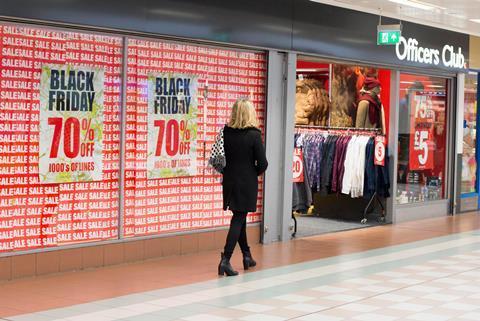Writer Alex Noel looks at how we can navigate the frenzy of Black Friday, and respond in a positive way

November brings with it colder weather, autumn colours and leaves crunching under foot. It also probably means that your inbox and social feeds have been filling up with a dizzying array of discounts and deals in anticipation of Black Friday. In the USA, the event follows Thanksgiving - the national holiday which traditionally sees friends and families getting together to eat turkey and pumpkin pie. The break also provides the perfect opportunity to entice customers with time off work, hungry for a deal.
Black Friday has become one of the biggest sales events of the year, and is now a global phenomenon.
In the UK we give little thought to its cultural context, but over the last ten years we’ve increasingly embraced this shopping extravaganza. Black Friday has become one of the biggest sales events of the year, and is now a global phenomenon.
But the pressure to join in, and the ensuing frenzy, can result in financial losses for retailers, buyers remorse for customers and ethical conundrums for businesses large and small. So how can we navigate Black Friday without losing our heads? And how can we build a more sustainable and ethical approach into our shopping habits in general? Proverbs 31 shows us a woman who considers her purchases carefully, and is conscious of those around her. Not drawn to being impulsive; she is wise and in full control of her choices.
While big deals generate sales and please customers, they can impact whole supply chains. Excessive demand for cheaper products means cutting corners in the production process and squeezing costs with suppliers. This negatively affects employees’ incomes, working conditions and labour practices, not to mention the environment.
Excessive demand for cheaper products means cutting corners in the production process and squeezing costs with suppliers.
As we scan the shelves or scroll through websites for things to buy, we can better consider the people and processes they represent by looking out for brands that are ‘B Corps Certified’. B Corporations are a growing movement of businesses that have undergone rigorous assessments to meet high ethical standards.For independent businesses, slashing prices may attract customers but it devalues the work of artisans and craftspeople who spend hours perfecting their craft and carefully making each item. We can help to honour these skills and livelihoods by choosing to buy from independent makers. They’ll return our investment by lasting longer, and provide us with a sense of satisfaction from owning something unique and handmade.
Read more on sustainable shopping
In 2021, Holly Tucker, founder of Not On The High Street launched ‘Colour Friday’, a campaign championing small businesses and providing shoppers with a way to avoid Black Friday altogether. For the eco-conscious ‘Green Friday’ is a similarly-minded initiative, with lots of ideas for how to turn Black Friday green.Of course, charity shops offer cheaper options all year round. Shopping second-hand or vintage is sustainable and there’s often a fun story to tell into the bargain - all while benefitting people in need.
You can reinvigorate tired clothes already in your cupboards with a simple update. If your favourite piece has got a bit worn, you don’t have to replace it. A good alterations place or tailor can repair items, or convert them into something more wearable - personalising them and extending their life even further. At a time when we’re increasingly conscious of the social and environmental impact of our actions, and are being further challenged by the cost of living crisis; Black Friday offers us a great opportunity to consider how to shop more wisely - making better choices for ourselves, other people and the planet. Now that’s something we can all be thankful for.































1 Reader's comment